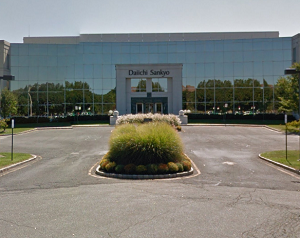 |
| Daiichi Sankyo's Parsippany, NJ, facility |
Times have been tough for Daiichi Sankyo, and they're about to get tougher for some of the Japanese company's U.S. staffers. The drugmaker is cutting its commercial headquarters staff by 16% on Monday, with more layoffs expected in mid-April.
The cutbacks are part of a revamp at Daiichi's U.S. business, based in Parsippany, NJ. The reasons for cutbacks are clear: Daiichi's exclusivity on the cholesterol drug Welchol expires in June, and a bigger product--the blood pressure drug Benicar--loses its lock on the market next year. That drug's $2.6 billion in annual sales accounted for 27% of Daiichi's sales last fiscal year.
Now, the latest belt-tightening is hitting the U.S. commercial team. "Following a thorough review of our business, we have made the decision to reorganize our operations, which includes the difficult step of select workforce reductions," spokeswoman Kimberley Wix told FiercePharma.
"This is an unfortunate, but necessary step towards addressing near-term challenges and positioning ourselves for long-term health and success." These cuts are limited to the commercial operations, with R&D and other functions unaffected.
Though the drugmaker has some newer products to market, it will take time to rebuild Daiichi's top line that way. Its new anticoagulant Savaysa entered a warfarin alternative market already crowded with blockbusters--including Johnson & Johnson ($JNJ) and Bayer's Xarelto--and comes with a black-box warning its rivals don't have.
And so far, M&A hasn't paid off. The Tokyo-based company's buyout of Indian generics maker Ranbaxy Laboratories was all but doomed by manufacturing problems that surfaced soon after the deal closed. The buyout failed so spectacularly that executives in Japan took a pay cut, and Daiichi bailed out last year, agreeing to sell Ranbaxy to fellow Indian drugmaker Sun Pharma. Other deals, such as its $410 million buyout of San Diego biotech Ambit, are R&D-focused, and won't deliver near-term sales.
The home-office cuts will fall mostly on the sales organization, according to sources close to the situation. Follow-up layoffs are also on their way. Sales reps in the field are set to find out their fate in mid-April, with cuts of 30% or more expected, sources said. Wix said she could not provide a percentage, but "we expect the number of field sales representatives being displaced to be limited."
Pharma sales forces have suffered waves of job cuts in recent years as big blockbusters fell off patent, many replaced by specialty medications. Those drugs tend to be prescribed by specialists, rather than primary-care doctors, which means fewer sales reps on the street.
Plus, as insurers and pharmacy benefits managers grow increasingly demanding, pharma companies have deployed more payer-focused sales teams. The last thing drugmakers want is for their new meds to end up excluded from top formularies, or tagged with top-tier, high-copay, prior-authorization status. Hospital-focused reps have also grown in number, as hospital systems snap up physician practices and higher-ups make more prescribing decisions.
Daiichi is one of the companies relying more on "key account managers" rather than front-line sales reps, according to a recent article in Medical Marketing & Media. The company now has 10 of those account managers marketing meds to 70 health systems.
The numbers on Daiichi's sales rep cuts are still in the works, Wix said. "Final decisions regarding the field sales staff will be made by mid-April," she said, noting that the company has "taken many steps to support colleagues of ours who are being displaced."
Special Reports: Top 10 largest pharma layoffs of 2013
Editor's note: This story was updated with more specific details about the ongoing job cuts, provided by Daiichi Sankyo.